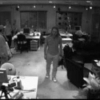Free Online Productivity Tools
i2Speak
i2Symbol
i2OCR
iTex2Img
iWeb2Print
iWeb2Shot
i2Type
iPdf2Split
iPdf2Merge
i2Bopomofo
i2Arabic
i2Style
i2Image
i2PDF
iLatex2Rtf
Sci2ools
113
click to vote
ICCV
2001
IEEE
2001
IEEE
Plan-View Trajectory Estimation with Dense Stereo Background Models
In a known environment, objects may be tracked in multiple views using a set of background models. Stereo-based models can be illumination-invariant, but often have undefined values which inevitably lead to foreground classification errors. We derive dense stereo models for object tracking using long-term, extended dynamic-range imagery, and by detecting and interpolating uniform but unoccluded planar regions. Foreground points are detected quickly in new images using pruned disparity search. We adopt a "latesegmentation" strategy, using an integrated plan-view density representation. Foreground points are segmented into object regions only when a trajectory is finally estimated, using a dynamic programming-based method. Object entry and exit are optimally determined and are not restricted to special spatial zones.
Computer Vision | Dense Stereo Models | Foreground Points | ICCV 2001 | Object Regions | Object Tracking | Special Spatial Zones |
| Added | 15 Oct 2009 |
| Updated | 31 Oct 2009 |
| Type | Conference |
| Year | 2001 |
| Where | ICCV |
| Authors | Trevor Darrell, David Demirdjian, Neal Checka, Pedro F. Felzenszwalb |
Comments (0)

